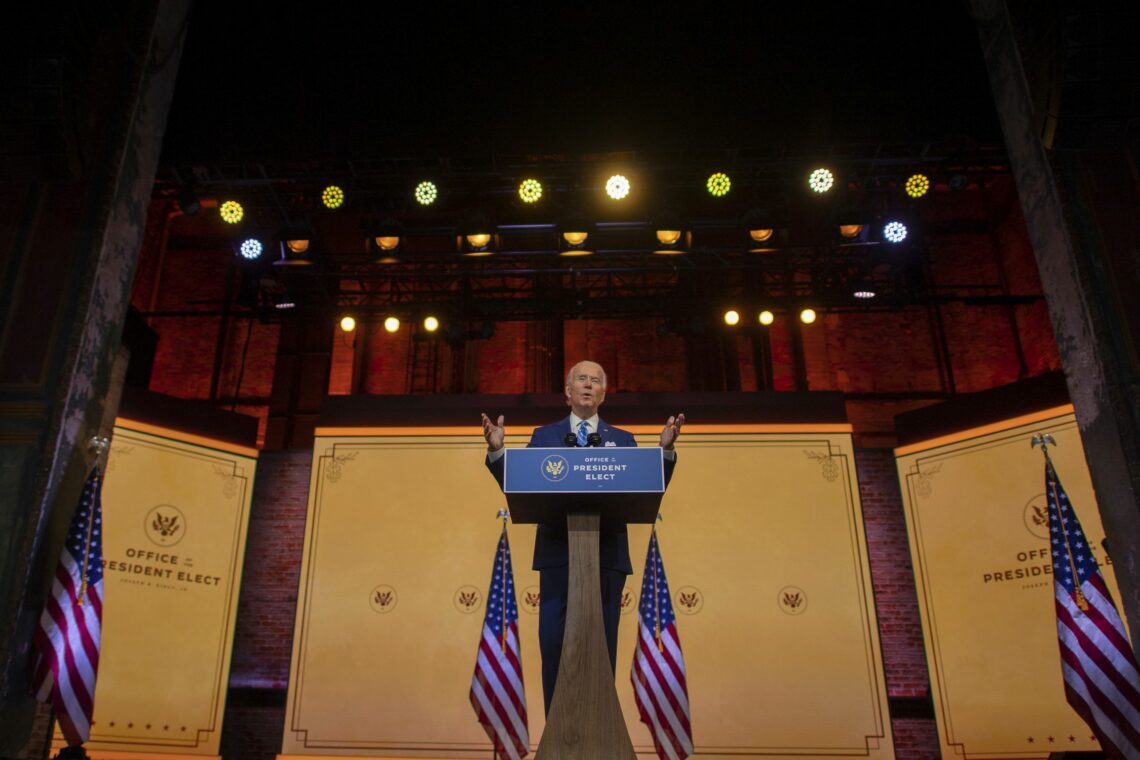Biden can build on Trump’s successes
Joe Biden’s victory in the U.S. presidential election may mean less change than many expect. President Trump had some important successes that instead of undermining, Biden should reinforce – despite his value-driven approach to foreign policy.

The 2020 elections in the United States have left us with an interesting state of affairs. A new presidency is about to begin, and expectations for it depend on one’s point of view: some are excited, some worried, some resentful.
Former Vice President Joe Biden’s victory – by virtue of some narrow wins in a few key states – was welcomed in European capitals and media with a sigh of relief. The European Commission and the High Representative for Foreign Affairs put forward a proposal for a “new, forward-looking transatlantic agenda.” It stated:
“While the past years have been tested by geopolitical power shifts, bilateral tensions and unilateral tendencies, the victory of President-elect Joe Biden and Vice-President-elect Kamala Harris, combined with a more assertive and capable European Union and a new geopolitical and economic reality, present a once-in-a-generation opportunity to design a new transatlantic agenda for global cooperation based on our common values, interests and global influence.”
It is true that on the surface, President-elect Biden might seem more friendly. That disposition, however, will not change the essential nature of U.S. relations with other countries. It will not alter its trade dispute with China, for example. In fact, Washington’s stance may even harden, as the new White House and the Democrats in Congress may be less pragmatic than the Trump administration in finding solutions.
Multilateralism’s decline
In overall trade policy, the administration may wish to return to multilateral solutions. That could prove difficult: multilateralism was already in decline before President Donald Trump assumed office. Increasingly, leaders are putting politics first. Long-term strategies for economy and trade are supplanted by shorter-term populist or ideological goals.
Supranational organizations like the OECD, G20 and United Nations advocate trading healthy competition for ideas of superficial solidarity. If leaders and countries continue following them down this path, successful multilateralism will remain an illusion. The change in administration will not resolve the differences between the U.S. and the European Union. Quite the contrary. The new administration is likely to increase sanctions on Russia, meaning European companies that do business there risk penalties imposed by the U.S. Justice Department.
Questionable values
The president-elect has announced a more value-driven policy and more collaboration with allies. Mr. Biden will try to show a more amicable American face to the world than his predecessor did, but President Trump had some notable achievements that the new administration would do well to build upon. Putting pressure on China was necessary. Beijing only changes course when faced with hard truths or when there are significant consequences for not playing by the rules. With the Chinese, friendly gestures and traditional diplomacy are ineffective.
The Trump administration’s hard line against Iranian aggression resulted in reconciliation and collaboration between Israel and several Arab states, notably Saudi Arabia. There is now real potential to foster Middle East stability and increase U.S. influence in the region, without the need to put troops on the ground.
Yet the Biden team has hinted that it intends to reenter the Iran nuclear agreement. Doing so would allow the regime in Tehran to solidify its economic and political position, without having to refrain from supporting terrorist organizations throughout the Middle East and Europe. The move is therefore not in line with the value-driven approach the future White House wants to apply.
Nor is that approach – which Mr. Biden’s team says is aimed at Riyadh and Moscow – pragmatic while Washington is at loggerheads with Beijing. It is likely to drive several countries, especially Russia, toward a closer partnership with an assertive China.
Dangerous experiments
Much will depend on whether the Republicans can defend their majority in the Senate runoff elections in Georgia on January 5, 2021. The outcome will be especially crucial for domestic and economic policies.
President Trump lost by a close margin in some states, even though Vice President Biden and the Democrats had the backing of many major media outlets and much more money to spend. The results are especially interesting because Mr. Trump’s support did not only come from white males without a college education, as the narrative is typically presented. He secured votes from across the population – including a higher than expected share from African Americans and Latinos. The president appealed to common sense, while his strategy and proposals contrasted sharply with progressive ideas that many consider elitist.
If the Republicans maintain control of the Senate, it might help the Biden administration resist pressure from the left wing of the Democratic party to enter a socialist experiment with the U.S. society and economy. A Democrat-dominated Senate could open the door to excessive tax increases and more regulation, which would damage the U.S. economy and devastate the working middle class. Such moves would also violate fundamental principles of liberty and the right to pursue happiness.
Some on the party’s far left advocate Modern Monetary Theory – which in a nutshell posits that government can spend as much as it wants, as long as the central bank keeps printing money. If the U.S. were to follow that path, it would weigh down the value of the dollar and sharply increase inflation.
To avoid those risks, President-elect Biden will have to hope that the Republicans win those Senate runoff elections in January.
